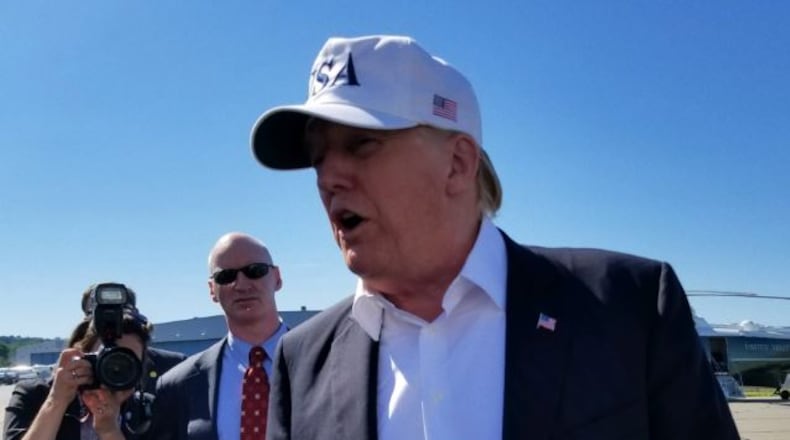President Donald Trump returned to the White House late Sunday afternoon saying he was nearing a final decision on his second nominee for the U.S Supreme Court in 18 months, telling reporters that his final four candidates were all 'excellent' choices, as he prepared to unveil his pick at a 9 pm ET Monday night event at the White House.
"I'm getting very close to making a final decision," the President said after leaving his golf club in New Jersey, giving no hints on whom he would pick, indicating to reporters that he had been deciding from a group of four federal appeals court judges.
“Let’s say it’s the four people," Mr. Trump said on the tarmac before boarding Air Force One. "They’re excellent, every one. You can’t go wrong.”
After a weekend of talks at his New Jersey retreat, Mr. Trump was still said to be weighing the same four circuit court judges who topped his list when he arrived there on Thursday night: judges Amy Coney Barrett, Brett Kavanaugh, Raymond Kethledge, and Thomas Hardiman.
The stocks of the four judges who had made the final cut had gone up and down over the past 72 hours, with some reports on Sunday that Hardiman - who was nearly chosen last year by Mr. Trump - was the favorite this time around.
But as with many decisions by President Trump - his mind could change at any point.
Barrett was seen as a pick that could excite more religious conservatives - but also as one which might create a very big battle in the Senate.
Kethledge had been considered a front-runner on Friday, but by Sunday, his chances seemed to drop, with the New York Times reporting that Mr. Trump had found the Michigan judge "likable, but comparatively dull."
Kavanaugh is well-known in Washington circles, but his ties to President George W. Bush had raised some questions among the President's supporters.
As for Hardiman, he had been the second place finisher last year to Justice Neil Gorsuch, and some reports indicated the Pennsylvania judge might turn out to be the number one choice this time around.
Sensing that, Democrats were attacking Hardiman - and the other three.
But Republicans still think a small group of Democrats might be pressured into voting for Mr. Trump's eventual nominee - there were three "Yes" votes by Democrats for Justice Gorsuch: Sen. Heidi Heitkamp of North Dakota, Sen. Joe Donnelly of Indiana, and Sen. Joe Manchin of West Virginia.
Other Democrats likely to feel the heat from the President about his pick include Sen. John Tester of Montana, Sen. Bill Nelson of Florida, and Sen. Doug Jones of Alabama, who won a surprise victory last December to win a GOP held seat in the Senate.
"I'm open to voting yes. I'm open to voting no," Jones told CNN's "State of the Union," saying he would make an "independent" choice.
"I don't think anyone should expect me to simply vote 'yes' for this nominee just simply because my state may be more conservative than others," Jones told CNN.
No matter whom the President chooses, Democrats in Congress, and Democratic groups in general were ready to press ahead with an all-out public campaign against the choice.
"Save SCOTUS," the liberal group MoveOn tweeted, as a series of more progressive groups called for a 'week of action' at Senate offices around the country to "demand the Senate protect our democracy."
But the simple math in the U.S. Senate is in favor of Republicans and the President - if they can keep their members behind Mr. Trump's choice. Even with Sen. John McCain (R-AZ) sidelined by cancer, the GOP holds a 50-49 edge.
Only a simple majority vote is needed, as filibusters are no longer allowed against Supreme Court nominations; that was changed by the GOP in 2017, in order to secure the confirmation of Justice Neil Gorsuch.
About the Author
The Latest
Featured



